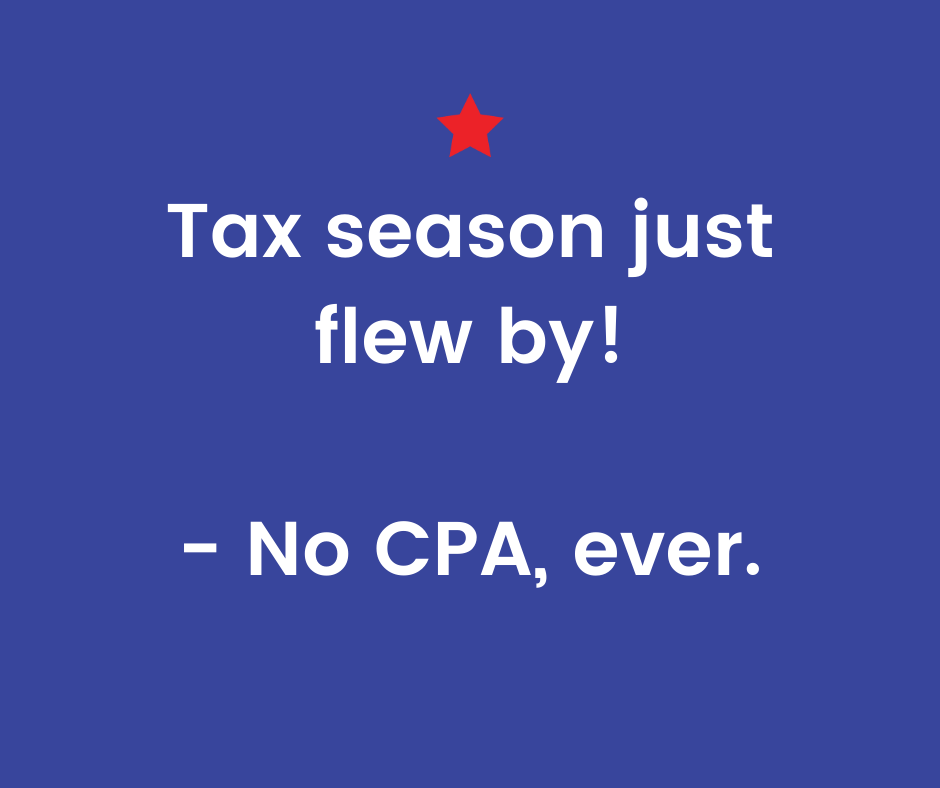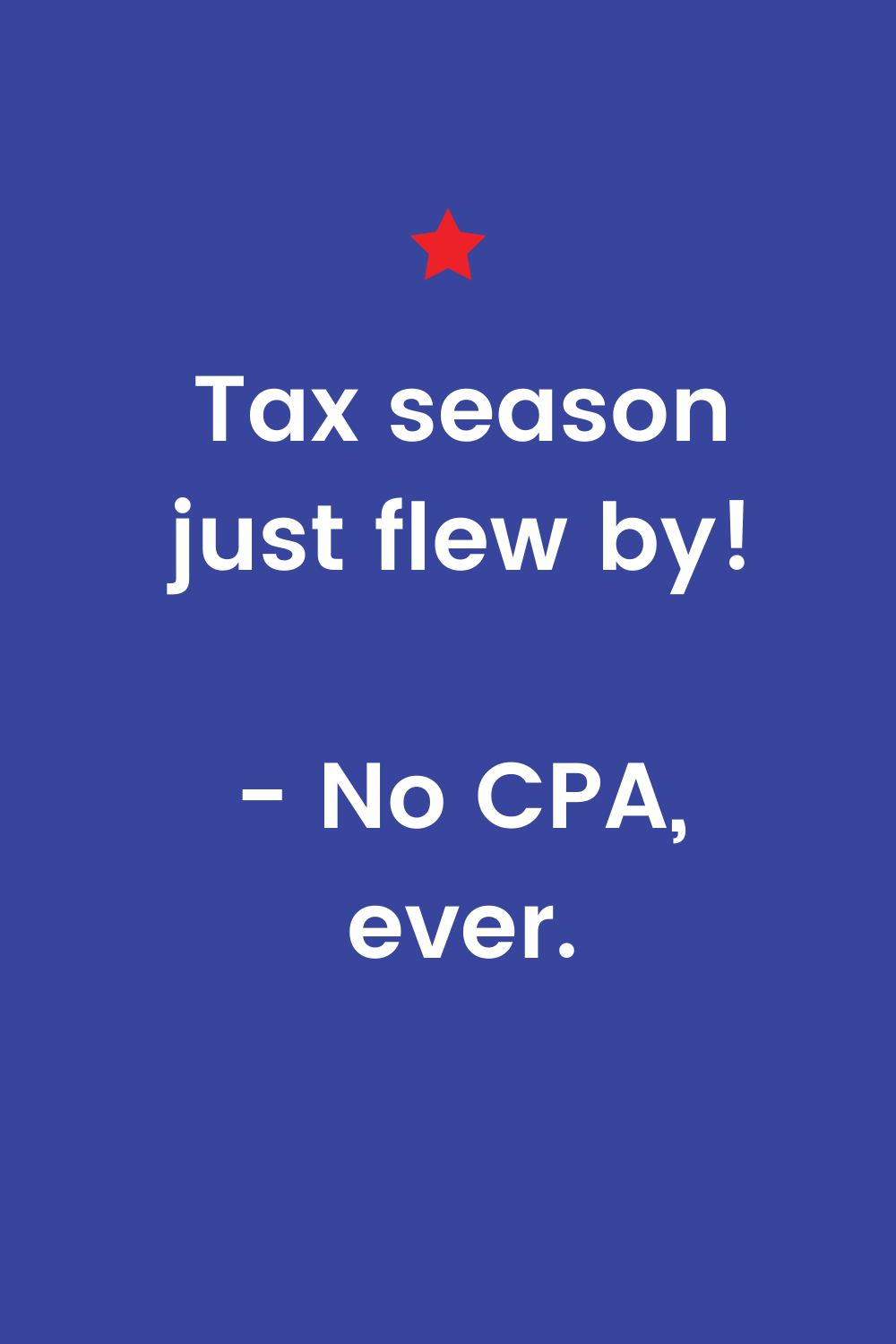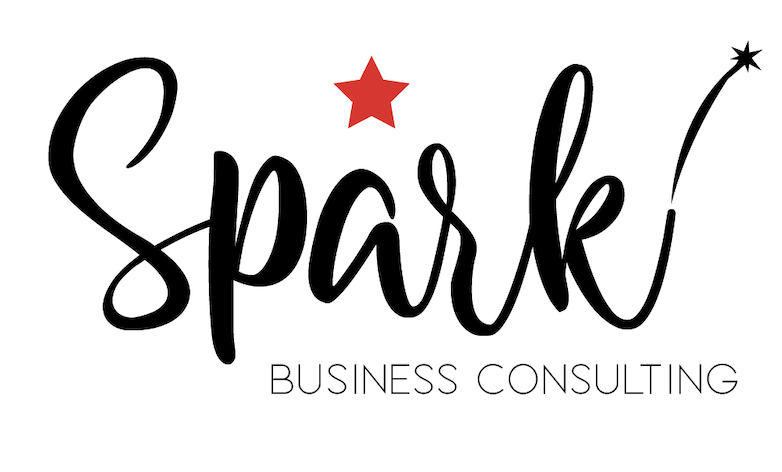We’re very close to the first tax deadline, and that’s what we’re going to talk about today – taxes for normal people – yay! We’re going to cover what to have ready because it shouldn’t really be a daunting time. Especially if you’ve been in business for long enough to have become comfortable with your taxes… and understand it’s just a way of life.
So, this blog is if you’re not already working with a bookkeeping or accounting firm and you’re doing this on your own. This is for you. Here is a timeline of what you need to do:
Corporations & Partnerships
First thing – you need to have your books completed and accurate. The first deadline is for corporations and partnerships and that is due March 15.
Extensions
There is really no great reason to go on extension that I can think of – there are certainly no financial benefits. It actually will cost you to go on extension. Extensions are not your friend – I cannot say that enough! So, just try and get it filed on time – it’ll save you time, money and get it off your plate.
Your books should be done – what does that mean? That means that you need to have all of your accounts reconciled; that is, all of your business checking and savings accounts, any loans, lines of credits, any credit cards and payroll. All of those accounts need to be reconciled.
What does Reconcile Mean?
Well, that means that whatever happened on those actual bank statements – those checking account statements, credit card statements, loan statements, and payroll reports is what is showing and correctly posted in your bookkeeping. Whether you’re using QuickBooks like we do, or another accounting software, every accounting software has the reconciliation feature that I know of.
And you want to do that because it keeps everything honest, true and accurate. Reconciling is really making sure that the actual formal bank statements that your banks issue- mirror what is going on in your books so that everything gets captured. So that’s number one. Every single one of your business accounts needs to be reconciled to the penny.
Then, here are some things to look for once all of those accounts are reconciled – that pretty much should shore up your balance sheet, that’s the first part that we do in making sure that all of the accounts look accurate as of the December 31, 2020 date.
Next: Your Profit and Loss
If your Balance Sheet looks good and everything matches the balances on those account statements from December, then you’re going to move over and review your P&L, Profit & Loss, Income Statement (they are all the same thing).
Your Revenue
Number one: Your “top line” is your revenue. Just make sure that number is truly revenue/sales/income. You want to make sure there’s no sales tax or other tax in that number. Sales tax is not income to you so don’t report it as income. That only belongs on the balance sheet. So make sure that your numbers don’t include sales tax, tips or gratuity of any kind, because again, that is not income to you. Those are pass-through transactions and go on to your balance sheet to track.
You want a true revenue number because you don’t want to claim more income than you actually created in 2020.
Interest Paid
The other thing that you want to do is make sure, when you’re reconciling any loans, credit cards or lines of credit, that you’re taking advantage of any interest that you paid throughout 2020. Sometimes it can be as simple as just getting that one year-end extra statement that highlights this. These statements are required of those companies that issue loans, lines of credit, and even credit cards in some way, shape or form to let you know the total amount of interest you paid in 2020.
You will want to make sure that interest expense is on your P&L because you get to write off the interest expense. You certainly don’t get to write off the loan payments – those payments are a balance sheet item because they’re lowering a liability. But the interest is an expense to you and you get to write that off, so you want to make sure that you have all that interest captured on your P&L.
Personal vs. Business Accounts
Then, once all that’s done and you’ve reviewed all of the accounts on your Profit & Loss, you might want to turn to any personal accounts. Now, hopefully you’re not commingling your personal and your business together. This isn’t not coming from any type of ethical or moral standpoint – I don’t really care about that when it comes to this. My saying this only comes from a money standpoint – it will cost you money if you co-mingle. Period.
First reason, it’s more expensive in so many ways to do that. Second reason, if you were to be audited, it wouldn’t go well. When an auditor sees commingling, they immediately think some type of fraud is happening and they’re going to dig that up. It’s not easy to make them go away when and if you get audited when there is commingling going on. If they start looking through your financials and they notice that everything looks like a business expense, chances are they might sit back and think “okay, this business is legit”, and they may not look as deep or for as long. However, they might when they start seeing personal stuff going through business accounts – it is just never a good thing.
So that’s the second reason why not to do it. The first reason is that it’s bad for you, personally, and it’s bad for your business. But if by chance, you had to use any type of personal credit card or debit card or whatnot to pay for business expenses, you might want to go through those personal statements. You may want to look and see if there was anything that you just pulled the wrong credit card or debit card out for, or any other reason that you used personal funds to pay for business expenses. It happens. And it can easily be missed so doing a review of personal accounts may catch more than you remember.
It Happens to EVERYONE
I know that it has happened with me actually every year. At some point during the year, I end up paying for something business-wise with a personal account, whether it’s through my credit card or debit card or checking account or even cash. And it could just be a convenience thing that I do at the moment. I have to go back and remind myself that I need to bring that over to my books, and that is done via a journal entry. If you’re not sure how to do a journal entry, I would just make sure you take that info to your tax accountant or your CPA. Just let them know that you paid for the item/service personally and they’ll know how to adjust for you.
So, you want to look through and make sure you’re capturing any expenses that you pay for personally, but for your business. One example is we’ve recently started working with a realtor and she was paying for her cell phone, personally. Now, for a realtor, they pretty much live on their cell phone for work. That is definitely a business expense, especially if you don’t have a separate one. I know a lot of times that you might be going to Target or Walmart on the weekend, or shopping on Amazon. Maybe you grab an extra roll of paper towels or toilet paper or whatever it is that you need at home, but also at your business. And guess what, now it’s a business expense – you want to look for those types of things to capture those expenses.

Payroll
That’s your P&L – it now should be good to go to your tax CPA. The next thing you want to do is maybe get a little package together for them so there’s not that much back and forth questions or requests from them. Another thing that a lot of CPAs look for is if you have payroll in your business… you will want to make sure you give them the 4 quarterly 941’s (your payroll company will have those), and also the annual 940, and the annual W-3. The annual W-3 is the total of all the W-2’s you have issued for employees and the annual 940 is a total of all the quarterly 941’s. So you want to have those ready to go to your CPA at tax time.
Make sure that the gross wages that are reported on the W-3 and the 940 match what your Profit and Loss statement is saying are your gross wages. If not, your CPA might just make an adjustment or they might make you go back and do the work to figure out the discrepancy. You will want to make sure that your gross wages are accurate because that’s a number on your tax return that has to tie to what the payroll company had been telling the IRS and your state all year round through those filings, so you want to make sure that payroll is totally matched to the penny.
December Statements
A lot of CPAs also want to see your December statements (ie. banking, checking, savings loans, credit cards). They might want to check your December statements to match the balances and make sure that that’s what your balance sheet has as well. So that’s pretty much the package that you need to send for the average business.
Your December statements for all your accounts, your Profit and Loss and Balance Sheet, any payroll quarterly and annual reports… That’s going to alleviate a lot of back and forth between you and your CPA.
Bottom Line
Now the last thing I just wanted to touch on before we sign off is the bottom line. The “bottom line” is your profit, that is what is taxable to you, no matter what entity you are.
I guess it’s almost like a double-edged sword in some ways… Some people want to see it high, meaning that they have a profitable, healthy business and they’re doing well. But that also means that you’re going to have to pay taxes on that profit.
On the other side of it, you might want to show a loss because you won’t have to pay taxes on a loss. But that doesn’t look good. Then you’re not operating a profitable business. That loss came from somewhere, meaning you probably either put a lot of money in your business personally or you have debt. So loss is not good unless your sole purpose in life is to not pay taxes, but that really only goes one way which is down the drain. So, believe it or not, you actually want to be profitable.
Taking Care of Taxes Quarterly
And the thing is, if you’re profitable, you should plan to pay anywhere between 20% and 25% in taxes on that bottom line, depending on what your personal circumstances are. Your goal should be to owe nothing as of April 15th when you file your personal taxes (because you should have been paying them quarterly throughout the year.) That’s the whole point of doing quarterly estimated payments – you look at your P&L every quarter, review the taxable profit, and you pay in that estimate.
If you do this quarterly, you’ve covered your taxes. So when you go to file your personal return, you’re at zero – that is always the goal. It’s not to get a big return, because that means that you just let the government use your money for free all year long. And you don’t want to owe a ton of money because then you’re gonna dread April 15 every single year, so the goal is always to hit zero or break-even.
In doing my taxes over the last 10-15 years, I’ve been up and down but over the last five years, and especially since I started Profit First, I usually either receive or owe about $100. That’s basically breaking even, which is great, and that money I just put to my next quarterly payment. But setting up those quarterly payments each year have completely eliminated the ‘Oh my god, it’s almost April 15 – taxes are due!’ moment. There’s an easy way to set up that system so you can still be happy about being profitable and not unhappy about having to pay taxes – it does all work out.
Profit First Cash Management System is a great way to do that but there are other ways to make sure that happens as well. So, that is it. That wraps up our tax stuff for today!



